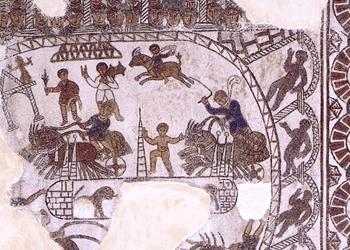World’s Last Latin Speakers in Africa? June 23, 2010
Author: Beach Combing | in : Ancient, Medieval , trackbackYes, yes, Beachcombing knows that those bores in the Vatican and some Finnish broadcasters still speak Latin. He’s even been into monastic libraries where they won’t give you a manuscript unless you babble something from Lewis and Short. But what Beachcombing wants to know – and he doesn’t think he’ll get an intelligent response for this on Yahoo Answers – is the identity of the last community of Latin speakers in the world. And by ‘community’ Beachcombing means children growing up learning the tongue of Augustus and Augustine at their parents’ knees not a conclave of cardinals.
One way to answer this is to look at which of Latin’s descendants – French, Catalan, Sardinian etc etc – is closest to Latin and then put the needle down on the map. But Beachcombing is interested in the last community to speak a pure (or purish) version of Latin, not the rapidly devolving Romance languages.
Beachcombing guesses that the latest Latin speakers were those on the outskirts of the collapsing Empire, where there was the need to keep Latin ‘proper’, while these often bilingual invariably barbarian communities grasped onto their fading Roman identity as the world went soggy around them. As such the bilingual inscriptions of sixth- and seventh-century Wales (Irish-Latin) are interesting because the Latin there seems to show characteristics of a spoken language. And this at a date when the Romance languages were becoming increasingly unlatin-like.
For Beachcombing though an even more exciting reference appears in the work of Muhammad Al Idrisi in the mid twelfth century. Al Idrisi, an Andalusan Arab writer, states in A Diversion for the Man Longing to Travel to Far-Off Places – a work best known for carrying the earliest reference to Italian (actually Sicilian) pasta – that the inhabitants of Gafsa in what is today Tunisia ‘are Berberised and the majority speak African Latin’. Could these have been the last Latin speakers in the world? It is a nice story, but Al Idrisi then gives the name of the town spring as tarmīd (a word still used today) that does not sound particularly Ciceronian…
In any case, spare a melancholy thought for those last ‘African Latin’ speakers in Capsa (to give Gafsa its Latin name). They had somehow struggled on to the twelfth century, about eight hundred years after Rome had given up ruling them. However, the last representatives of the old Roman province of Africa were living fossils and we hear no more of them after Al-Idrisi’s charitable mention: Christianity was also vanishing from this corner of the Maghreb in these years.
Certainly, by the time that the notorious pederast and author Norman Douglas got to Gafsa in 1911 the African Latin speakers were just a distant dream: ‘The Kasbah is an interesting place… Thousands of blocks of Roman masonry have been wrought into those walls, as well as such a number of ancient inscriptions that a French traveler described the fortress as a ‘musee epigraphique’. Yes, this must be the attraction of Gafsa those old stones lingering like ghosts among a people who have lost all memory of their meaning. There is no continuity of tradition here, as in countries like Greece, And this complete rupture of all links with the past, in the face of these speaking memorials of the past, has a certain charm.’ ‘Stones of Gafsa’, North American Review 147 (1911), 747-748
Beachcombing, pathetic sentimalist that he is, would shed a tear, but he kept thinking, instead, of Douglas scouting around the Kabash for his boyish prey. Beachcombing hopes to hear nothing more of Douglas, but he would love to hear of other theories on the last Latin community. For what it’s worth his money remains on the periphery. Wasn’t there a late reference to Latin from Dacia with the word frater in it? Beachcombing has not been able to track down the quotation. drbeachcombingATyahooDOTcom
Cosmin writes, 25 Feb 2016: As a regular and avid reader of your strangehistory.net I noticed an inquiry at the end of an old article “World’s Last Latin Speakers in Africa”, namely about tracking down the “Latin from Dacia with the word frater in it”.
It is probably the “torna, torna fratre” quotation from Theophylactus Simocatta, concerning an episode during a military campaign in 587 AC. More on this:
https://en.wikipedia.org/wiki/Proto-Romanian_language
http://cultureroutesinturkey.com/c/via-egnatia/files/2011/12/Map-Via-Egnatia-modern-names-660×351.jpg
Looking at thee maps provided in the Wikipedia article you will also easily notice that the modern Macedo-Romanian language depicted there (one of the Romanic languages with very strong roots in Vulgar Latin) is still spoken in certain areas along what used to be the roman Via Egnatia. It makes sense that such an important road uniting Italy with Constantinopole saw an important military roman presence in form of legions and veterans settled in the cities and villages built alongside it. Small communities of Latin speakers succesfully survived in enclaves here, mostly in the hinterland areas, surrounded by Greek speakers.
The Macedo-Romanian translation of “Torna, torna fratre” is not so surprisingly then “Turna (ti), turna (ti), frate” – turn, turn (yourself) brother.
The language is still spoken in Greece, parts of Bulgaria and southern Romania.



